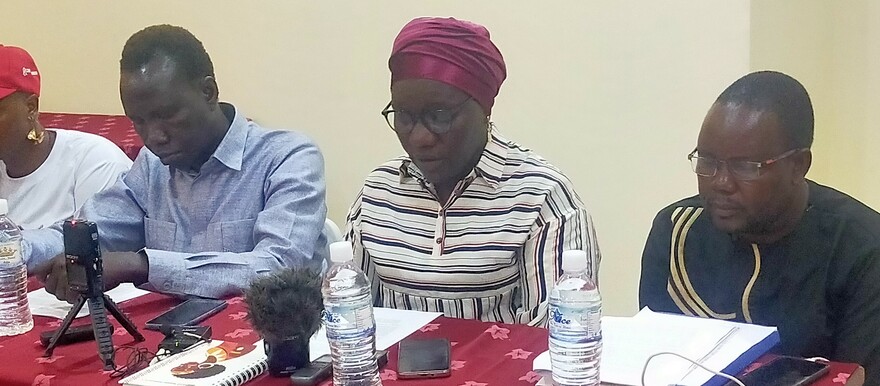A coalition comprising over 70 South Sudanese and regional civil society organizations has expressed serious concerns about the pace of implementing the peace agreement as the country approaches next year’s elections.
South Sudan was meant to conclude a transition period with elections in February 2023, but the unity government failed to meet key provisions of the agreement, including drafting a constitution and unifying the army.
The parties to the agreement extended the transitional government’s time in office for another two years, meaning general elections would be held in December 2024.
During a joint news conference in Juba on Thursday, Zabib Musa Loro, civil society activist, emphasized that South Sudan is entering a critical period that has the potential to destabilize the young nation if not approached with caution.
Loro highlighted ongoing conflicts claiming lives, displacing entire communities, escalating political tensions, and exposing civilians to threats from both state and non-state actors. Additionally, she pointed out the existing challenges of hunger and insecurity already faced by civilians.
“Many of our political and military leaders are still enriching themselves through the misappropriation of our national wealth. Now is the time to set a different course for South Sudan. The decisions we make in this period will shape the trajectory of our country for years to come,” stated Zabib.
“While the Revitalized Agreement on the Resolution of the Conflict in South Sudan (R-ARCSS) offers a roadmap for transitioning from war to peace, our core values must continue to guide our actions during and beyond the life of the peace agreement. There are certain principles we can all agree upon,” she emphasized.
She urged an immediate halt to killings and other human rights violations against civilians. “Firstly, we must put an end to killings, abductions, disappearances, torture, and sexual and gender-based violence (SGBV). Secondly, it is imperative to prevent the recurrence of war in South Sudan. Building a nation through the barrel of a gun is not the way forward. Thirdly, achieving meaningful peace requires inclusive, participatory, and people-centered processes. When given the space to deliberate on coexisting peacefully, the people of South Sudan have repeatedly demonstrated the wisdom and capacity to solve their own problems,” she emphasized.
The activist highlighted that processes such as constitution-making, transitional justice, national elections, and other transitional procedures offer structures and mechanisms to forge a new path for current and future generations. These processes are not mere bargaining chips; they hold significance beyond the life of the agreement and must be fully embraced.
The activists are advocating for a credible and inclusive constitutional-making process rooted in Chapter VI of the revitalized peace agreement and the Constitutional Making Process Act of 2022. This process aims to produce a permanent constitution that accurately reflects the values, aspirations, and priorities of ordinary people in South Sudan.
Expressing their deep concern, one activist stated, “We are troubled by the fact that the envisioned critical transitional processes outlined in the agreement, leading to national elections at the end of the transitional period, have not yielded results. The country now faces the prospect of an election lacking significant foundations, including fundamental clarity on the type of government we will be voting into existence and the absence of independent mechanisms to address disputes that may arise before, during, and after the elections.”
“We have concerns regarding the evident political affiliations within the recently established transitional mechanisms, specifically the National Elections Commission. This commission holds a crucial oversight role. Despite these concerns, we are ready to actively engage in ensuring that fundamental principles of inclusivity, non-violence, and democratic governance are maintained in any upcoming election process. We commit to robustly participating moving forward,” she added.
To contact Radio Tamazuj with comments, news tips or information, write to radiotamazuj@gmail.com or use the contact form.




